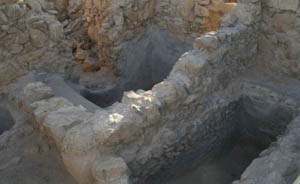Why Mikveh?
Immersion in a mikveh facilitates the transition to a new spiritual status and sensitizes our bodies to a higher level of holiness.
The transformative powers of the mikveh’s waters….A woman descends in a state of ritual impurity, and emerges pure. A convert descends a gentile, and emerges a Jew. From the bride or groom before their wedding day, to the convert on his/her initiation into Judaism, to the woman who uses the mikveh monthly to experience personal and marital renewal—all experience life changing moments upon immersion into the mikveh’s waters.
The mikveh has been used for ritual purification since our earliest history. Kohanim (priests) in the Holy Temple in Jerusalem immersed in a mikveh before Temple rituals. The laws of family purity, which have also been observed since ancient times, require mikveh immersion.

Mikveh located at the ruins of Massada
Mikvaot are found at archeological sites dating back to ancient times. Mikvaot have continued to play a central role in Jewish life through the ages and can be found in every country and location where Jews have resided—even in such unlikely places as the top of Mount Masada.The maintenance of a mikveh is a communal responsibility. Traditionally, a community was charged to set aside funds to build a mikveh even before building a synagogue or buying a Torah scroll. This is because of its centrality to the continuation and growth of Jewish life. By creating a place where our Jewish heritage can be experienced first hand, we enable our community to pass on traditions that have sustained our people for generations.
The mitzvah of family purity (Taharat HaMishpacha) is one that is uniquely feminine. It is a mitzvah that helps define a marital relationship and completely revolves around the woman and her natural life cycles.
For approximately two weeks each month a woman and her husband refrain from physical intimacy, focusing instead on the other aspects of the marital relationship—friendship, trust, and connection on a spiritual level. After this two week period of time a woman prepares herself for immersion in the mikveh’s waters. This preparation and immersion is the woman’s time for herself—for personal reflection and renewal—and should be a relaxing and pleasant experience.
The immersion into the mikveh’s waters signifies the rekindling of marital intimacy. Since immersion in the mikveh is considered like a rebirth, it is also a time for new beginnings—whether it be in a woman’s personal life, her life with her husband and family, or in how she relates to the world around her.